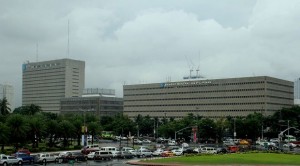So what if the battle over the protracted “privatization” of the 153-MW Naga Power Plant Complex (NPPC) in Cebu would continue? It would only hurt the consumers in Cebu, both households and businesses, because it meant that the NPPC upgrading would be delayed.
The publicly listed SPC Power Corp. disclosed to the PSE that it filed—again—a motion for reconsideration with the Supreme Court in the case on NPPC. The government fire-sale firm PSALM has been trying to unload NPPC in the past seven years precisely because the plant needed fresh investments.
Last week the Supreme Court dismissed the first MR filed by SPC, thus deciding—with finality—that NPPC would go to the Aboitiz firm Thermal Power Visayas or TPVI. A Cebu-based newspaper reported that, with the SPC filing of the second MR with the Supreme Court, the legal battle for NPPC was not yet over. Uh-oh.
By the way, at the strike of 12 midnight this Jan. 1, 2017, mobile calls between the “duopoly” telcos Globe and PLDT would be cut by a substantial rate of 40 percent. Now, this is a country with more than 100 million sim cards in active use so that the rate cut should only make all the millions of calls in those millions of business deals a lot cheaper.
The cut would be effected by a memorandum circular issued recently by the National Telecommunications Commission. It ordered Globe and PLDT to reduce their “interconnection” rates, although from what I heard, the two actually had a prior agreement to do precisely that. It was just that NTC acted on the agreement faster than lightning, issuing the memo right away.
The NTC memo put a ceiling on their rates at P2.50 a minute, and according to NTC Deputy Commissioner Edgardo Cabarios, the average rate would drop by at least P1 a minute, or some 40 percent lower.
Say what you will about the motorbiking Duterte Harley, his crashness and dirty mouth, but he is still the only President of this Republic who did threaten the duopoly. You know—they would have to improve their services within a year or else…
From what I heard, the administration wanted to speed up its program to upgrade our internet service, particularly the plans to build a national broadband network. That would actually cut some more the costs of mobile service in this country.
But back to the NPPC case, when PSALM held the bidding for the plant in 2014, the Aboitiz firm submitted the highest bid of P1.09 billion.
Now, seven years ago in 2009, SPC actually signed an arrangement with PSALM to continue operating one of the two plants in the complex. Part of the arrangement was the so-called RTT, or the right to top, which said that if PSALM would sell the entire complex in the future, SPC simply had to match the highest bid to get the complex.
Former Sen. Sergio Osmeña III nevertheless filed a case before the Supreme Court over the RTT, seeking to strike it out of the PSALM bidding rules. Early this year the Supreme Court ruled in favor of Osmeña, declaring that the RTT was indeed anticompetition, damaging public biddings. It was just that, later on, the Supreme Court added an extra to the main decision: That PSALM should award the sale to the Aboitiz firm TPVI.
PSALM of course questioned the added attraction from the Supreme Court that looked like a winfall bonanza with a bit of bonus for the Aboitiz firm TPVI. Well, the Aboitiz firm TPVI actually took part in the PSALM bidding, fully aware of the RTT in the rules.
The Supreme Court, in effect, declared the terms of the bidding as illegal, which should nullify the entire bidding altogether. Yet, instead of holding another bidding, PSALM must now give the complex to the Aboitiz firm TPVI. Fact: The bid of the Aboitiz firm TPVI was about P1.09 billion, which SPC topped by about P54 million with an offer of P1.14 billion, or 5 percent higher. Again —that was a P54-million difference!
The last time I checked, the Plunder Law (RA 7659) put the amount of the crime of plunder at only P50 million.


